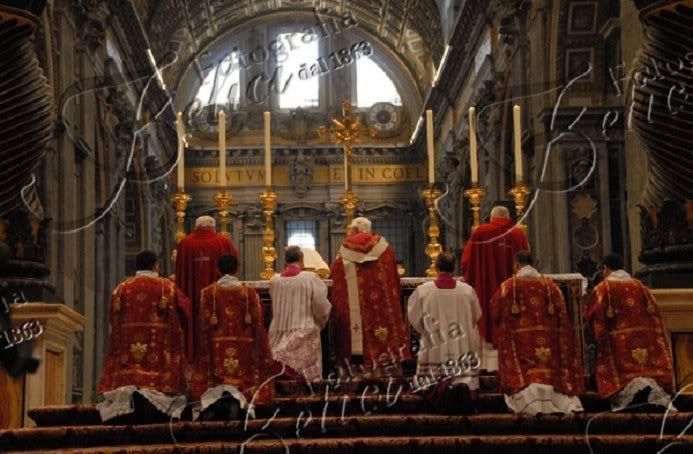 The Pope gave a Homily at the Beautiful Pentecost Mass yesterday. I will not post the whole thing since Zenith News Agency has it all in one nice link. It is a short one and worth reading.A lot of great pictures can be found here on this page of the Ratzinger Forum. . Also check here at the bottom of this page in the Italian section for more pics I shall be posting his Pentecost Angelus in a bit
The Pope gave a Homily at the Beautiful Pentecost Mass yesterday. I will not post the whole thing since Zenith News Agency has it all in one nice link. It is a short one and worth reading.A lot of great pictures can be found here on this page of the Ratzinger Forum. . Also check here at the bottom of this page in the Italian section for more pics I shall be posting his Pentecost Angelus in a bit
Pentecost is the most "Catholic" of all days in the Church Calender when you think about it. I note this part of Pope Benedict's Homily:
I would like to reflect on a particular aspect of the Holy Spirit, on the intertwining of multiplicity and unity. The second reading speaks about this, treating of the harmony of the different charisms in the communion of the same Spirit. But already in the passage from Acts that we have listened to, this intertwining reveals itself with extraordinary evidence. In the event of Pentecost it is made clear that multiple languages and different cultures belong to the Church; they can understand and make each other fruitful. St. Luke clearly wants to convey a fundamental idea, namely, in the act itself of her birth the Church is already "catholic," universal. She speaks all languages from the very beginning, because the Gospel that is entrusted to her is destined for all peoples, according to the will and the mandate of the risen Christ (cf. Matthew 28:19).
The Church that is born at Pentecost is not above all a particular community -- the Church of Jerusalem -- but the universal Church, that speaks the language of all peoples. From her, other communities in every corner of the world will be born, particular Churches that are all and always actualizations of the one and only Church of Christ. The Catholic Church is therefore not a federation of churches, but a single reality: The universal Church has ontological priority. A community that is not catholic in this sense would not even be a Church.
In this regard it is necessary to add another aspect: that of the theological vision of the Acts of the Apostles in respect of the journey of the Church from Jerusalem to Rome. Luke notes that among the peoples represented in Jerusalem on the day of Pentecost there are also "foreigners from Rome" (Acts 2:10). At that time Rome was still distant, "foreign" for the nascent Church: It was a symbol of the pagan world in general. But the power of the Holy Spirit will guide the steps of the witnesses "to the ends of the earth" (Acts 1:8), to Rome. The Acts of the Apostles ends precisely when Paul, by providential design, arrives at the empire's capital and proclaims the Gospel there (cf. Acts 28:30-31). Thus the journey of God's Word, begun in Jerusalem, arrives at its goal, because Rome represents the whole world and thus incarnates the Lucan idea of catholicity. The universal Church is realized, the catholic Church, which is the continuation of the chosen people and makes its history and mission her own.
Monday, May 12, 2008
Pope Benedict Talks About Catholic Church in Pentecost Homily (Full Text)
Posted by
James H
at
5/12/2008 12:23:00 PM
![]()
Labels: Catholic, Pope Benedict, vatican
Subscribe to:
Post Comments (Atom)















No comments:
Post a Comment